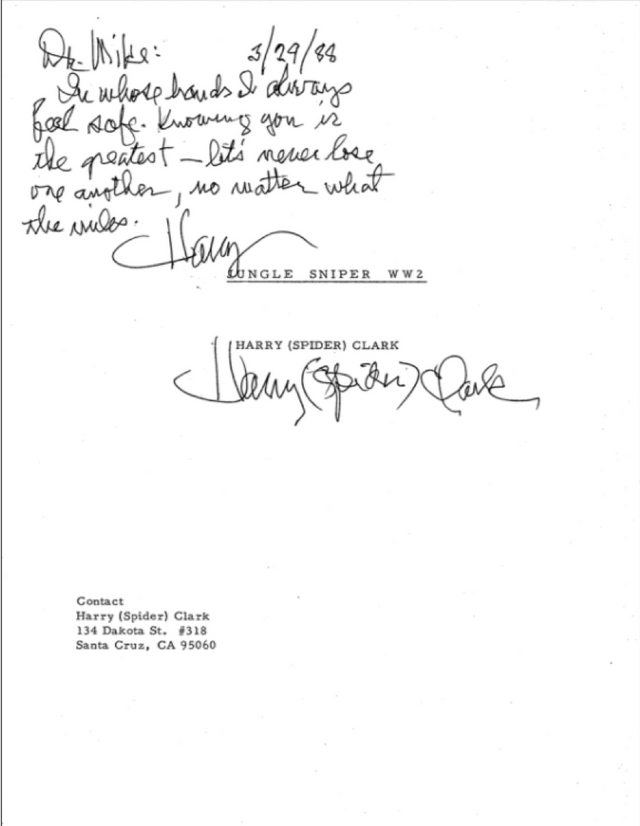Jungle Sniper WW2 by Harry "Spider" Clark, INTRODUCTION
This is a manuscript given, entrusted to myself and my wife Juliette in the late 80's while doing our medical research at Stanford University.

The author, Harry Clark, was a patient of mine and we grew a friendship into something quite special outside of the clinic. who entrusted me to publish it any way I could. Here's to you, Harry! Where ever you might be, Juliette and I hope your view is good! Happy Travels!
INTRODUCTION
War - of any kind, anywhere, for any reason - is insanity. Then why do I write of my war experiences? Certainly not to praise war, to prove its rightness, to reveal its excitements, Its traumas, or even its tragedies. No! We have had enough of that. I write some episodes in the lives of two young snipers, one called Spider, one Moe, to show that war, because of its physical and emotional necessities, creates a form of bonding among persons, and among groups, a form of close cooperation toward common objectives.
In the year 1943, a boy of the age of eighteen, was considered normal if celibate, was a way of life. Innocence was a sort of merit badge one wore with pride. Yet these young boys were to become men almost over night, as the war called.
It is now widely recognized that we are in an age of transition when we are seeking higher motives for our bonding, let us say spiritual motives- not war. We must find them and incorporate them into our lives if we are to survive. Yet in this period we still seem to have a nagging desire to glimpse again in the high drama of war the essence of survival bonding and its meaning. Of this I want to speak.
Being brought up by a very Victorian Grandmother in California, I was always in a warm,loving, nurturing environment until I was suddenly drafted into the army. At that same moment, in Lubbock Texas, another eighteen year old, Moe, raised very much the same, by a great aunt, had also been drafted.
At the very moment of my graduation from high school, 1942), I had been offered a scholarship to the Chounard Art Institute of Los Angeles.
How do you teach an artist to kill? If he happens to have exceptional eye-hand coordination and physical alacrity, you train him to be a interrogational sniper. So began my career in the U.S. Army, in the 32nd Division, the division that had more actual combat hours in World War II than all of the divisions in all of the wars combined in American history.
When war is over and a soldier returns to the "normal" (what ever that is) routine of living, coping, working and relating, his memory bank sends up a constant barrage of war pictures.
Naturally, mostly horror. After a while, if he is unable to unload these pictures, they crush him. That is what happened to me. So, after a few attempts at suicide to wipe out the pictures once and for all, I sought a psychiatrist. Discovering that I was an artist, he wisely suggested that I sketch the images. I did. The therapy worked. As it happened, the fifteen sketches, labeled with droll titles for contrast, toured our army bases from coast to coast.
Now, at this 60 - moment in my life, I have felt compelled to respond to the requests of many young people who have been either students in my many classes or my more than one hundred charges in two youth rehab centers on the west coast. They know nothing of war and are fearful and curious. Also, I am responding to many friends who over the years have asked me to to put down the experiences I have shared with them.
I have tried here in these "verbal pictures" to give glimpses of war attitudes we hear little about, attitudes of kindness, thoughtfulness, love and compassion that lie deep beneath hate, aggression, fear and the brutality that is required to "win at all costs".
Each episode is true, nothing has been added, nothing left out. You, the reader, bring to these sketches whatever of your self you have of curiosity, of possible reminiscence, of understanding and I hope, most of all, love. For some of the highest emotions of love are shown, unfortunately, in war where personal life is at stake, and it is all or nothing. I share with you the young doctor at the beach, Mutt and Jeff, the little orphans, the priest, the "sparrow", Carlotta, the hidden nuns, the Nip soldier, the Luke, the training Sarg, Houdini, the igorot, the Japanese lieutenant, who all knew or had heard of The Lady Of Consequence.
